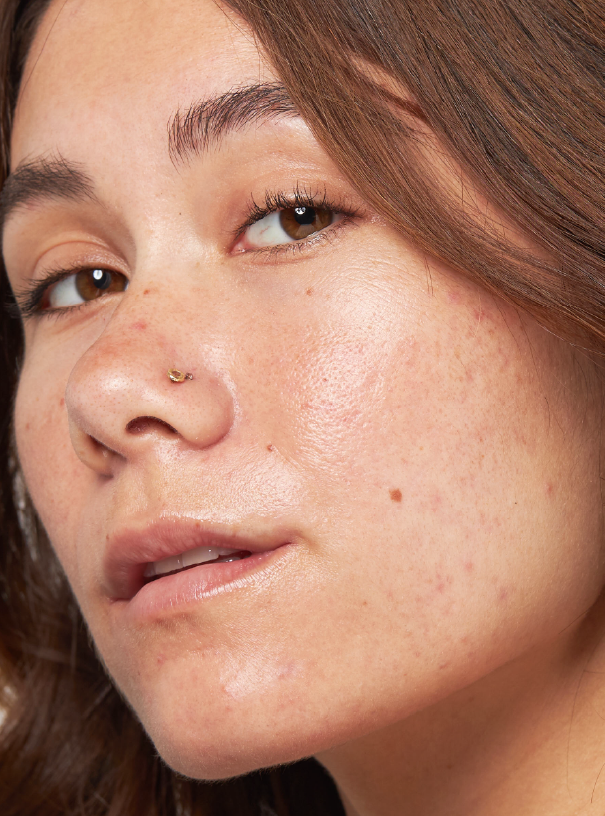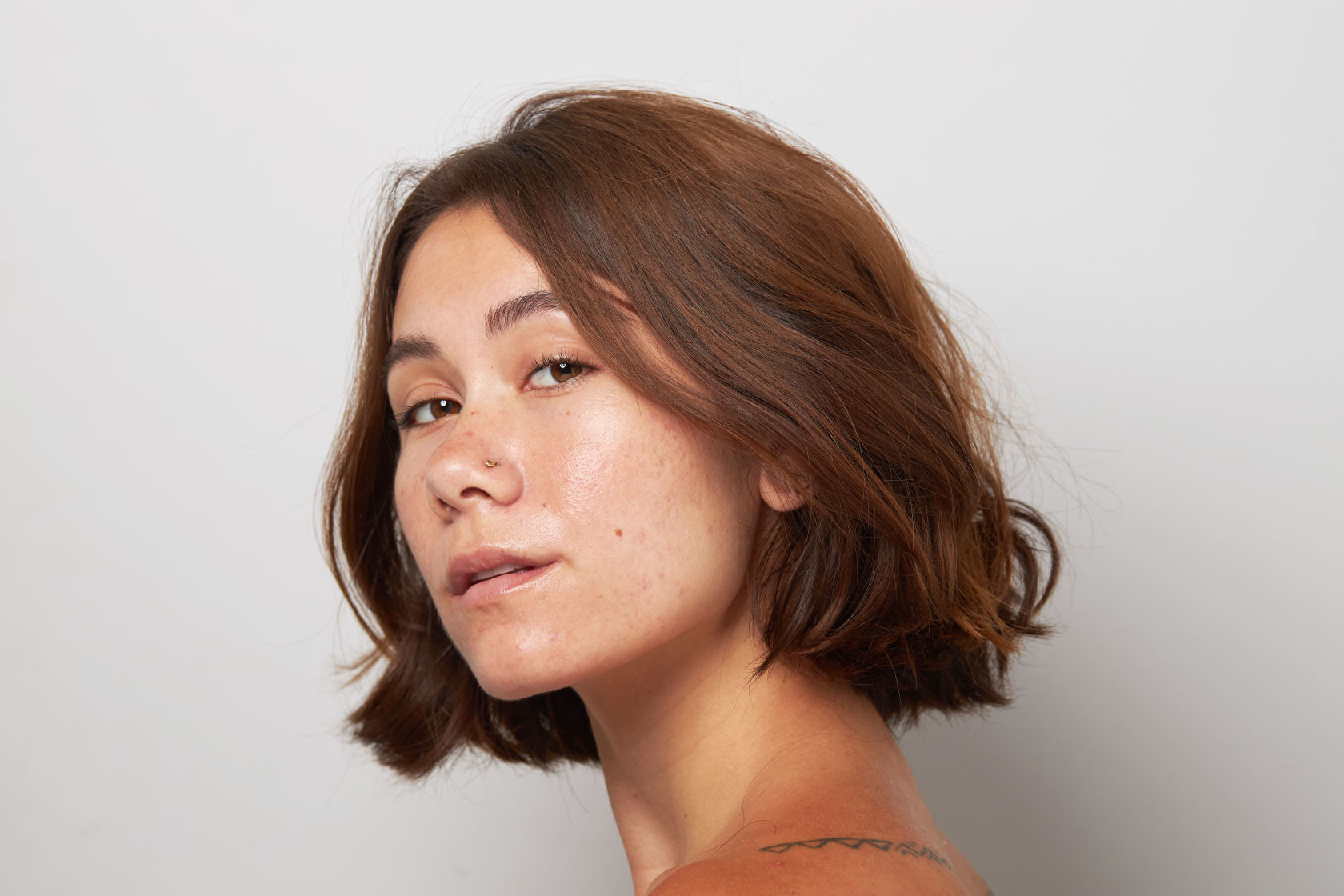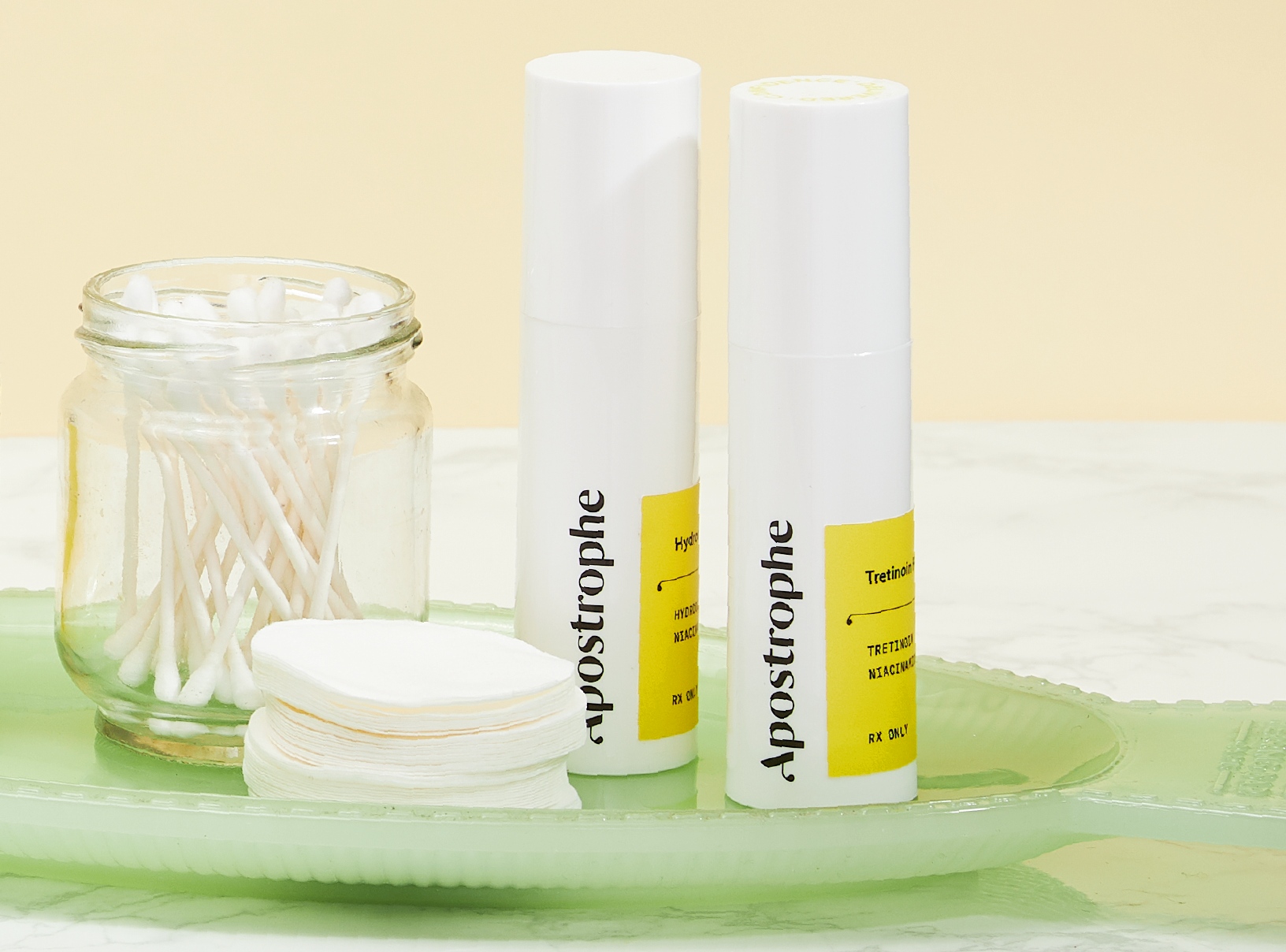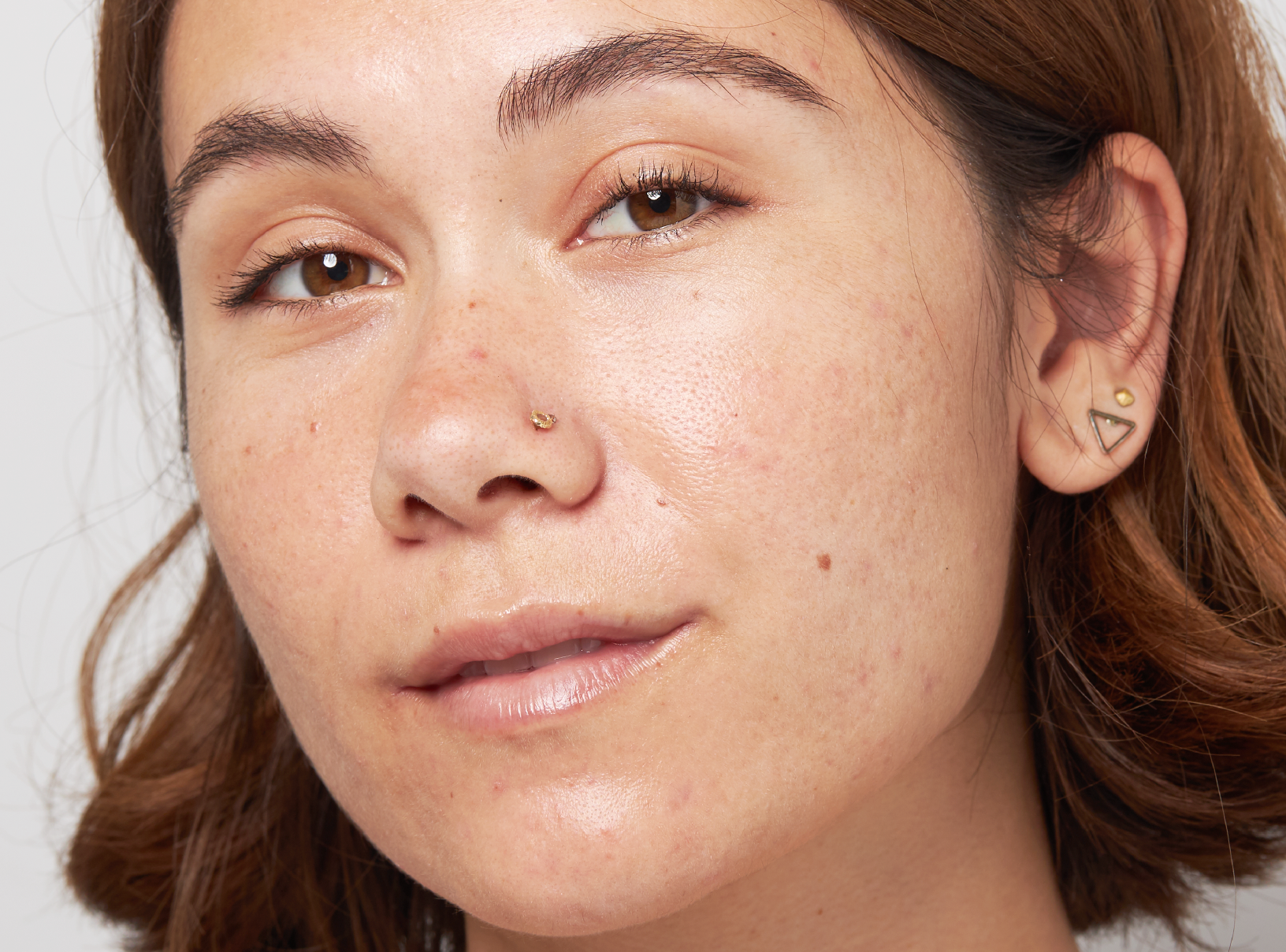Education
How to Remove Acne Scars Naturally


SHARE
Education
How to Remove Acne Scars Naturally
Medically reviewed by Kristin Hall, FNP
Written by Apostrophe Team
Last updated 4/5/2024
Acne is a problem that, for many people, causes either temporary or recurring problems. The oily skin, pimples, blemishes, and breakouts associated with acne affect people differently, and for most folks, the damage is temporary. Sometimes acne can leave scars, however, and you may be wondering how to remove those acne scars from your face naturally.
Everyone dealing with skin damage and the effects of scarring acne wants a solution. Whether it’s damage from acne lesions, lingering dark spots, or different types of acne scars — it’s normal to want it all gone.
Read on to learn ways you can possibly remove or reduce acne scars naturally, along with ways to prevent acne from occurring in the first place.
Why Acne Scars Your Skin
Acne scars your skin when the healing process from the pimple either produces too much or too little collagen to replicate what was there before you had the blemish.
Too much collagen and you’ll have a raised, bump-like scar. Too little collagen, and you’ll have a small depression or pockmark.
Acne scars aren’t caused by any one thing like a skin condition, or as a result of a particular skin type, but rather they result from a variety of risk factors that make you more or less likely to be left with a scar.
The first and most important risk factor for developing acne scars is genetics. If you have a relative who has scars resulting from acne, your risk is higher than that of someone who doesn’t have a family history of acne scarring.
There’s also one difference between the types of acne that will and won’t scar: whether it’s inflammatory. Inflammatory acne has a higher risk of causing scars, but it’s not necessarily a certainty. This is because inflammatory acne tends to penetrate the skin more deeply, causing more severe damage.
Other risk factors that increase your chances of scarring due to acne include how you do (or don’t) treat your acne. A person who delays or fails to seek treatment for inflammatory acne, cysts, and nodules may increase their risk.
Additionally, people who pick, pop, squeeze, or otherwise manipulate their acne may increase their scarring risk (not to mention their infection risk).
When you pop your pimples, there’s a chance of forcing the bacteria and other infectious material deeper into your skin. This may increase the risk of deep scarring and also boost inflammation.
That said, all of these factors are just metrics for predicting possible outcomes; your potential for acne scars is really only certain if, well, you already have a scar.

HYPERPIGMENTATION TREATMENT
Target dark spots and hyperpigmentation with customized prescription treatment.
Are Acne Scars Permanent?
Acne scars are permanent, yet they may fade over time. They’re not going to just go away, however, without some external support. Both depressed and raised acne scars can benefit from several kinds of treatment. (Read more on that, below.)
That said, it’s possible that even with treatment, some acne scars will remain. Treatments and surgical procedures aren’t 100 percent successful in 100 percent of cases, and they carry risks of minor and major injury to the skin in the process.
The American Academy of Dermatology advises people to consider why and to what extent removing scars is important, in part because procedures can be both costly and require serious recovery.
Acne-scar removal procedures are also elective treatments and are typically not covered by insurance.
Good candidates for removal are those who feel self-conscious, feel their daily lives are affected by their scars, and feel that their social comfort and opportunities have been harmed as a result of the acne scarring.
If you decide to get your acne scars removed, there are essentially two ways to do it: surgically or naturally.
How to Remove Acne Scars Naturally
When people typically talk about natural acne-scar removal treatments, they often mean at-home processes like exfoliation that use the skin’s own cellular reproduction to make scars go away.
As to how to remove deep acne scars naturally, there’s varying research backing up the claims. (And results aren’t necessarily guaranteed.)
There are many natural oils, for instance, that have been associated with better skin health in limited studies. Rosehip oil, sunflower seed oil, avocado oil, almond oil, olive oil, and coconut oil have all demonstrated some benefits for the skin — whether that benefit is reducing inflammation due to antioxidant properties, or promoting better cellular function and healing.
The truth is murkier, though. Even if these products promote healing, reduce scars, treat inflammatory acne or do something else of benefit, there’s no medical industry consensus on how much you should use or how often.
Numerous ‘natural’ acne scar removal products on the market make somewhat dubious claims under these limited studies. And they might also be wrong.
Instead, the more proven “natural” approach to fighting acne scars is to have a healthcare professional implement dermal fillers, microneedling, and chemical peels. Fillers and chemical peels can utilize natural ingredients in the forms of salicylic acid and retinoids, respectively.
Retinoids are a commonly used tool for supporting healthy new skin growth, and they’ve been effective in reducing the appearance of wrinkles and scars in studies. (They can also promote collagen production.)
Salicylic acid helps with exfoliation and may help reduce the appearance of scars by keeping healthy, new cells visibly on the top layer of skin, and doing away with dead skin cells promptly.
Some of these “chemical peel” options come with risks of irritation (especially for those with sensitive skin), but compared to more invasive surgical procedures, they might be a more gentle option. (They may not be an ideal choice, of course, if you have sensitive skin.)
Other Ways to Remove Acne Scars
There are mechanical and surgical procedures for the treatment of acne scars, and a healthcare professional can help you determine the right course of action for treatment.
These might include procedures like microdermabrasion, scar surgery, skin tightening, collagen induction, electrodesiccation, injections (as mentioned above), cryosurgery, and more.
Often, with these procedures, the surgery or treatment itself is merely mimicking the exfoliation process in a more extreme fashion. Electrodesiccation, for instance, is just a procedure where an electric probe kills certain groups of cells, causing certain pronounced types of scarring to lessen.
Treatments such as these are also used as part of a full treatment plan and not standalone treatments.
Skin tightening, meanwhile, tightens the skin, which lessens the appearance of depressed acne.
If you’re considering one of these procedures, we strongly recommend you talk to a healthcare provider about your options first. Non-invasive options (like exfoliation via retinoids) may be effective before you get to the surgical options.

CUSTOMIZED HYPERPIGMENTATION TREATMENT
Get customized treatment for your dark spots, melasma, and hyperpigmentation.
Removing Acne Scars from Your Face and Body: Next Steps
Acne scarring isn't always preventable, nor is it always solvable. There are treatment options, though, to help you reduce the appearance of your acne scars.
Some scars might fade, while deeper ones may remain. The best way to find out what your options are is to consult with a healthcare provider for guidance.
A healthcare professional can help you identify your acne treatment options, so you can be on your path to clearer skin.
3 Sources
Acne scars: Overview. American Academy of Dermatology. (n.d.). Retrieved February 22, 2022, from https://www.aad.org/public/diseases/acne/derm-treat/scars.
Kravvas, G., & Al-Niaimi, F. (2017). A systematic review of treatments for acne scarring. Part 1: Non-energy-based techniques. Scars, burns & healing, 3, 2059513117695312. https://www.ncbi.nlm.nih.gov/pmc/articles/PMC5965325/.
Lin, T. K., Zhong, L., & Santiago, J. L. (2017). Anti-Inflammatory and Skin Barrier Repair Effects of Topical Application of Some Plant Oils. International journal of molecular sciences, 19(1), 70. https://www.ncbi.nlm.nih.gov/pmc/articles/PMC5796020/.
Like what you just read? Sign up for our email list to get the scoop on skincare science delivered straight to your inbox.

Deep Dives
A dermatologist shares his thoughts on the recent studies about benzoyl peroxide and benzene.
Read More
Education
What is milia?
What is milia? Today, we’re jumping into one type of bump that you may have heard about most commonly in infants — milia.
Read More
Education
Best moisturizer for acne-prone skin
If you have combination acne-prone skin, figuring out which moisturizer is best for your skin might be tough. In this guide, we break down the best moisturizer for combination, acne-prone skin.
Read More